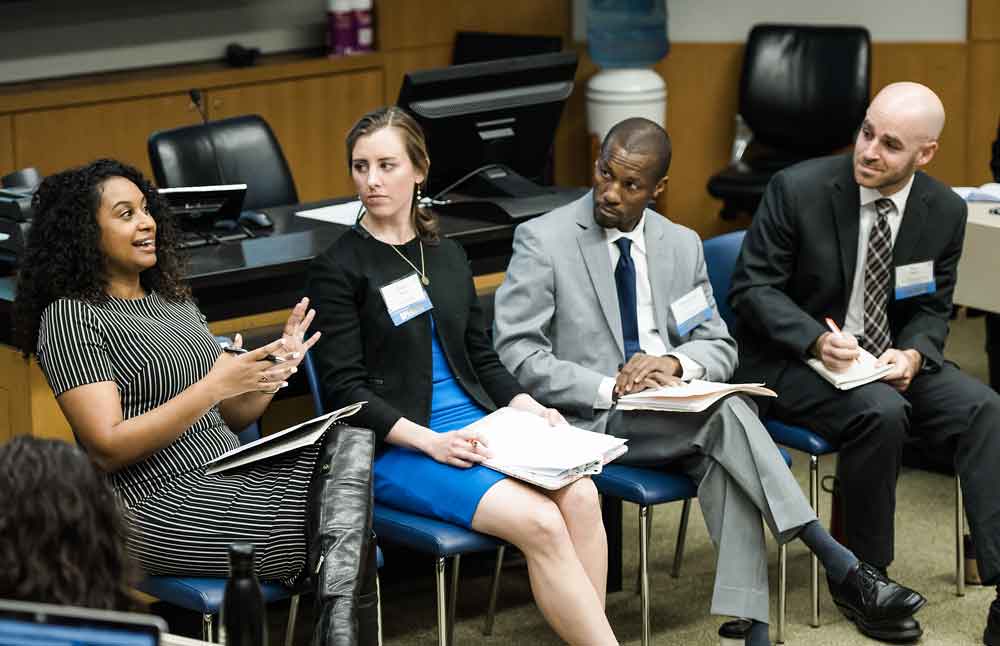This post was written by David Claps, Fuqua Daytime Student and organizer of the Sustainable Business and Social Impact Conference, in February 2018.
“Diversity, equity, and inclusion should be everyone’s job,” said Dwayne Marshall, Senior Director of Programs and Partnerships at Southeastern Council of Foundations and panelist on the Sustainable Business and Social Impact Conference (SBSI) 2018 discussion on diversity, equity, and inclusion (DEI). “All too often, in the corporate and not-for-profit sectors, that role and responsibility falls to the feet of women and people of color.”
How can an MBA use their business skills to effect changes around DEI and other impact areas? It sounds like a basic question, but as I have made my way through the Daytime MBA Program at Duke’s Fuqua School of Business, a potential answer gets harder to pin down. That’s because business leaders can do a whole lot in so many different ways, as evidenced by the conversations had throughout this year’s SBSI conference.
There were so many takeaways from the day, but I found those from our DEI panel to be especially powerful as I think about how to lead inclusive work teams.
On the panel was Dan Baum of The Redwoods Group Foundation, Jessica Barron of Frontline Solutions, Sarah Glova of Reify Media, and Dwayne Marshall of the Southeastern Council of Foundations. Each brought insights on DEI that were relevant to their business experiences whether as a business owner, manager, or consultant. If you are as committed as I am to leading an inclusive workplace, here are four pillars to live by:
Leadership must be on board
If leadership designates a working group to materialize the company’s DEI strategy, but is absent from the process, these strategies will lose effectiveness in changing company culture. DEI initiatives cannot exist in a vacuum. There must be buy-in from teams of all levels so that everyone’s input can be realized, understanding of the initiative pervasive, and messaging from leadership consistent.
Agree on a definition of inclusion
DEI means different things to different people. Successful endeavors to create DEI at organizations rely on a shared goal across staff, business units, and working groups. This starts with everyone agreeing on and understanding what inclusion means in the context of their work environment, and how to measure success. Jessica suggests one benchmark of success is to review the visibility of your definition of inclusion. Can it be found in your mission statement, company values, policies, and job descriptions?
Understand the needs of the team
All work on building inclusive environments must start with communication. Communication between staff will prevent companies for implementing canned ideas of what they think makes an inclusive work environment. Sarah gave a simple example in her company’s remote work policy. Instead of assuming that working from home would be an enjoyable benefit for everybody, she listened to her team about what their needs were and devised a modified policy that was more inclusive of people’s individual needs. For Reify Media, this included access to co-working spaces.
Even these simple examples lay the foundation for a culture that respects each individuals’ perspective and unique needs.
Amplify others
As members of a diverse team, we should be cognizant of a peer not being heard or understood. If a colleague’s ideas are not being recognized in a meeting, you can amplify their voice by repeating their idea and giving them credit. If someone can’t produce their best work on the spot, give them space and time to digest the problem. We can be better peers by attempting to understand everyone’s working styles – this will amplify their voice and help to create a more supportive work environment where everyone can shine.
These takeaways resonated with me because they are simple, memorable ideas and tools that we, as future business leaders, can bring to any organization. I am positive I am not the only one who walked away from this panel – and others throughout the day – with new tools across a variety of subject areas that will come in handy in carving out our future, impact-filled careers.
About the Author
David Claps is a first-year MBA at Duke’s Fuqua School of Business. At Fuqua, David has engaged with the social impact space through CASE i3 and Net Impact, and was a student organizer for the 2018 SBSI Conference. Prior to Fuqua, David merged his background as a professional dancer with social impact through a career in arts management, most recently at Alvin Ailey American Dance Theater. He also served as a founding board member of JUNTOS Collective, a nonprofit that brings collegiate dance students on cultural exchange and immersion trips throughout Latin America.


